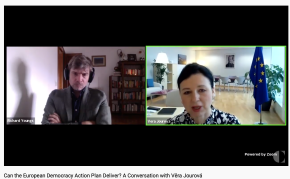The EU is set to adopt its flagship European Democracy Action Plan (EDAP) with a promise to improve European democracy. It includes a number of ambitious actions to tackle problems of disinformation and online political advertising, as well as to strengthen Europe’s media ecosystem. In addition, it strengthens commitments of the EU institutions and Member States towards to deliberative democracy and participatory policy-making beyond elections.
For example, the Action Plan encourages Member States to make best use of relevant EU structural and investment funds to support and reinforce civil society capacities and involve civil society organisations in the partnership with the different levels of public administration, including by building a deliberative democracy infrastructure.
The Action Plan also commits to fighting abusive use of strategic lawsuits against public participation (SLAPPs), which are toxic for investigative journalists’ and civil society’s ability to fulfil their watchdog functions. Finally, the Action Plan promises to increase its efforts to strengthen media literacy and empower citizens to make informed decisions through supporting civil society (including funding). The EU will also support initiatives aimed at helping civil society actors to participate in public debate and strengthen cooperation across civil society at the European level.
However, the Action Plan is completely silent on challenges and deterioration of civic space within the EU. It forgets that improving public participation, the capacity of civil society and the state of democracy cannot be done without an enabling environment for civic space. While the new European rule of law mechanism has introduced some efforts to tackle civic space challenges, these remain very broad and general, without mechanisms to support concrete actions regarding serious harms on civic rights and freedoms in some Member States.
During a discussion with the European Commission Vice-President Věra Jourová and Richard Youngs, organized by the Carnegie Institute Europe, Ms Jourová, reiterated vital support to enhance active participation at all levels, including EU level, with public wide consultation.
That is why we therefore call for additional meaningful action by the Commission to live up to these expectations, for instance with an Inter-Institutional Agreement on Civil Dialogue or a strengthened Rule of Law mechanism regarding protection of civic space issues.
